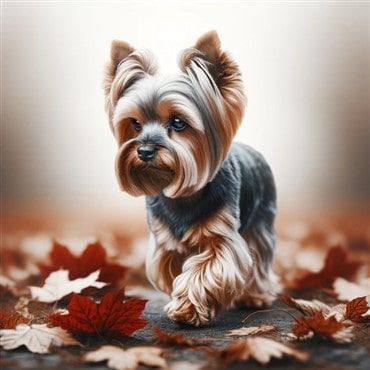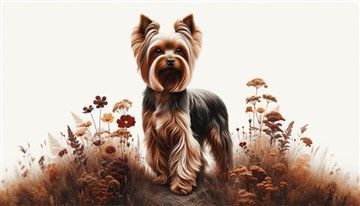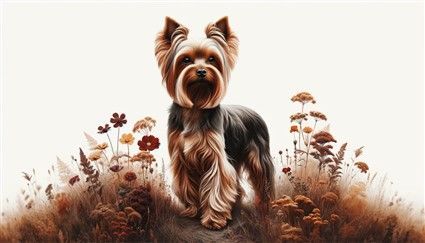Yorkshire Terrier Senior Care
Overview
This article focuses on understanding and caring for a senior Yorkshire Terrier, which brings a unique set of experiences and challenges. From understanding subtle changes in behavior and physical health to adapting care routines to meet their evolving needs, we'll explore the key aspects of senior dog care.
The goal is to equip you with the knowledge and tools needed to provide the best possible care for your aging Yorkshire Terrier, ensuring these years are as golden as they deserve to be.
Please note: YorkieInfoCenter is reader-supported, and some of the product suggestions on this page are affiliate links. As an Amazon Associate we earn from qualifying purchases. This is at no extra cost to you and helps us continue providing free, high-quality information.
The Age a Yorkshire Terrier Becomes a Senior
With canines, there is no official age that they become seniors. And each breed reaches this stage at a different pace. This said, most toy breeds, the Yorkshire Terrier included, are deemed to be seniors by the age of 8 to 10 years old, marking a significant phase in their life.
The transition into senior status is influenced by a combination of factors, including genetics, health history, and the care they've received throughout their life. Recognizing and embracing this stage is crucial for pet parents, as it involves adapting to the evolving needs of their faithful companions, ensuring their comfort and well-being in these gracefully maturing years.
Top 10 Signs a Yorkshire Terrier is Getting Older: Changes to Expect with Senior Yorkshire Terriers
As Yorkshire Terriers age, they undergo various changes that indicate they're entering their senior years. Recognizing these signs can help pet parents provide the care and attention needed to maintain their Yorkie's quality of life in their golden years. Here are the top 10 signs that a Yorkshire Terrier is getting older, followed by by tailored care tips in the next section:
#1 Increased Sleep Needs: Seniors often require more sleep than their younger counterparts, sometimes resting up to 14-16 hours a day of combined nighttime sleep and naps. This increase in sleep is due to their lower energy levels and the body's need for more rest to recover and maintain health.
#2 Decreased Activity Levels: There will be a gradual decline in their activity levels. A senior may show less interest in long walks or play sessions, primarily because their stamina diminishes and joint health begins to wane, making extensive activities more challenging. It is important to offer supplements for joint health and to maintain daily exercise.
#3 Joint and Mobility Issues: Linked to the above sign of aging, arthritis or other joint problems can become evident. Your Yorkie might have difficulty standing up, climbing stairs, or show reluctance to jump or play.
#4 Dental Health Issues: Seniors are more prone to dental issues, including tooth loss and gum disease. This is due to years of wear and tear, making dental care an important focus to prevent discomfort and infection.
#5 Hearing Loss: With advanced age, there is reduced hearing, which may manifest as being less responsive to verbal commands or their name being called, being unreactive to familiar sounds, or being easily startled. Patience is key, and adapting communication methods, like using hand signals or slowly turning a light switch off and on before entering a room, can help maintain connection and ensure their comfort.
#6 Decreased Vision: Senior Yorkshire Terriers often face a reduction in their vision and may have difficulty navigating familiar environments, hesitancy in low light conditions, or bump into objects. This change can be due to the natural aging process or health issues like cataracts. It can help to provide ample lighting, keep walkways and indoor pathways clear, and avoid moving furniture to help mitigate the effects of poorer vision.
#7 Weight Changes: Older Yorkies may experience weight gain due to decreased activity levels or weight loss from various health issues. Monitoring their weight and adjusting their diet accordingly is important.
#8 Coat and Skin Changes: The once vibrant and silky coat of a Yorkshire Terrier may become thinner and less lustrous with age. Additionally, skin may become more sensitive, necessitating gentler grooming practices to maintain their comfort and coat health.
#9 Behavioral Changes: With advanced seniors, there may be changes in behavior, such as increased vocalization or confusion, often attributed to the cognitive decline associated with aging. This includes canine cognitive dysfunction, a condition similar to dementia in humans, affecting memory, perception, and awareness.
#10 Graying Hairs: Just like humans, Yorkies can start to show gray hair, especially around the muzzle and face, as they age. This is one of the most visible signs of a dog getting older.
Note: Recognizing these changes with senior Yorkshire Terriers is essential for providing the appropriate care and support they need during their golden years. Next, we cover important care tips for this phase of life that addresses these changes and more.
Care Tips for Senior Yorkshire Terriers

Caring for an older Yorkshire Terrier involves a blend of love, attention, and strategic adjustments to accommodate their changing needs. Here are detailed care tips that will help ensure your senior Yorkie enjoys their golden years in comfort and health.
#1 Twice-per-year vet checks.
Once a Yorkshire Terrier reaches the 8-year mark, it’s time for wellness checks to increase from once per year, to twice per year. These more frequent vet visits are crucial for early detection of common senior health issues. Tests will include a complete blood count, urinalysis, chemistry panel, and, if necessary, an electrocardiogram, stool testing, and X-rays to monitor health closely.
#2 Adjust your senior’s exercise regimen.
It's vital to keep your Yorkie moving regularly; older dogs that lack consistent daily exercise can experience diminished mobility and agility, leading to a decreased quality of life. Transition to shorter, more frequent walks to avoid overtaxing their joints, ensuring they remain active without strain. Integrate gentle activities that encourage movement such as gentle play sessions with soft toys or engaging in slow-paced fetch games in a safe, enclosed area.
#3 Assess dietary needs.
While transitioning to senior-specific dog food isn't a universal requirement, it's important to stay vigilant about any changes in your Yorkie's eating habits. A mild reduction in appetite is typical as dogs age, however, pronounced alterations in eating behavior warrant a consultation with a veterinarian to exclude potential health problems.
The priority should always be to uphold a balanced diet that nurtures their overall well-being, tailored to their unique senior needs. For more details on meeting these dietary requirements, refer to the section below on Feeding Tips for Senior Yorkshire Terriers, which offers valuable advice on accommodating the nutritional needs of your aging companion
#4 Consider dietary supplements for senior dogs.
With senior Yorkshire Terriers, maintaining joint and hip health becomes crucial. Joint supplements with glucosamine HCI and chondroitin offer essential support for cartilage repair and maintenance, helping to cushion joints and alleviate pain. These supplements not only improve joint function but can also significantly reduce discomfort, enabling older Yorkies to enjoy improved mobility. One that we like is Zesty Paws Mobility Bites which has glucosamine HCI, chondroitin, OptiMSM (a premium form of Methylsulfonylmethane for muscle health) and Vitamins C and E.
Additionally, incorporating omega fatty acids, especially Omega-3, into a senior dog's diet can alleviate inflammation related to arthritis and simultaneously enhance skin health and coat luster. A straightforward method to include omega-3s is through fish oil, available in liquid or chewable forms. We highly recommend Zesty Paws Wild Alaskan Salmon Oil; most Yorkies require just about 1/2 teaspoon daily, which can be conveniently mixed into their food.
#5 Do not ignore dental issues.
Ensuring dental health through regular cleanings and check-ups is crucial to prevent gum disease and tooth loss, which are prevalent in senior dogs. Never assume it's "too late" to improve an older Yorkie's dental health. For gentle at-home care, if brushing their teeth proves challenging, consider using a dental spray designed for canines, like the Pets Are Kids Too Premium Pet Dental Spray. This can be mixed into a Yorkie's water, but applying it directly to the teeth yields the best results.
Additionally, integrating dental chews that are specifically formulated for seniors can aid in cleaning their teeth and strengthening their gums in a gentle way. One like Greenie Teenie Aging Care Dental Treats are easier to chew than their regular treats, but still offer a way to remove plaque and tartar. These are designed for small dogs 5 to 15 lbs, are easy to digest and have added antioxidants.

#6 Make grooming adjustments.
As Yorkies age, their skin becomes more sensitive, and their coat may thin. Opt for high-quality grooming products with a pH between 6.5 and 7.5, featuring plant-based cleansers like coconut, free from sulfates, dyes, or soaping agents. After shampooing, use a conditioner, allowing it to penetrate for 5 to 10 minutes. Bathing products we like are Earthbath Oatmeal and Aloe Shampoo and Conditioner which helps prevent and treat dry skin and other skin issues.
You can also enhance your Yorkie's coat and skin health with a leave-in spritz, which can offer vital protection against UV rays, winter dryness, and contact friction. A good spray can also shield against airborne and ground irritants, ensuring their skin and coat stays healthy and resilient. A recommended choice for a protective leave-in spray is Nootie Daily Spritz; this offers protection and has some pretty amazing scents.
#7 Optimize sleeping arrangements.
If your senior Yorkshire Terrier doesn't have an orthopedic bed, investing in one is essential for their comfort and health. Orthopedic beds, especially those with memory foam, provide the necessary support for aging joints and bones, offers relief from pressure points and aids in better sleep quality.
For those Yorkies already enjoying the benefits of an orthopedic bed, it's important to regularly assess its condition. On average, dog beds should be replaced every 2 to 3 years, but this can vary depending on the bed's quality and how heavily it's used. Look for signs of wear and tear, such as sagging areas or the foam not rebounding to its original shape, as indicators that it's time for a new one.
#8 Make the home safe and comfortable.
Senior Yorkies do best in stable, familiar environments. A serene and predictable setting aids in maintaining their mental well-being and reduces stress. Try to keep your home layout consistent by not rearranging furniture.
With that in mind, it's equally important to make thoughtful modifications that can enhance their quality of life. For instance, installing safety gates at the top of stairs can prevent accidents if your aging Yorkie struggles with vision or mobility. Additionally, if your guy or gal enjoys lounging on sofas or beds, a pet ramp is a considerate addition, facilitating easy access while protecting their joints and preventing injuries from jumping or falling.
One option is the SweetBin Wooden Adjustable Pet Ramp, which is sized for small dogs and easily adjusts to fit against any sized bed, chair, couch or other furniture that a dog may want to reach.
#9 Address temperature sensitivity issues.
Be vigilant about your senior Yorkie's comfort regarding weather changes. Their tolerance for cold and heat diminishes as they age, making them more susceptible to discomfort and potential health risks associated with extreme temperatures.
During colder winter months, ensure they have warm bedding and consider clothing them in a snug sweater or coat during walks. In contrast, during hot weather, provide ample shade and water, and avoid outdoor activities during peak sun hours to prevent overheating. Additionally, maintaining an indoor environment with stable, comfortable temperatures can greatly contribute to their overall well-being, using fans, air conditioning, or heating as necessary to create a safe and cozy space for your senior companion.
#10 Provide mental stimulation.
While older, aging Yorkshire Terrier will nap more, be less active and enjoy quietly resting, this does not mean that they do not require mind exercise. Engage your senior Yorkie with gentle, mentally stimulating activities to help maintain their cognitive functions and enrich their daily routine.
This may include taking them with you to run errands to pet-friendly stores to allow them to experience new sights, smells and sounds or offering a puzzle toy like the YepPuppy Hide and Seek Snuffle Puzzle Toy; with this, you hide little treats in each 'chips' roll it up, tuck it in the 'chip bag' and your Yorkie will their nose (and mind) to figure out how to reach the goodies.

Feeding Tips for Senior Yorkshire Terriers
As Yorkshire Terriers enter their golden years, they face unique dietary challenges. Adjusting their feeding routine can ensure they continue to receive necessary nutrition and enjoy their meals. Here are key adjustments to consider:
#1 Softening Hard Kibble: For senior Yorkies with tooth loss, softening their food is essential. Adding warmed low-sodium chicken or beef broth to kibble makes it easier to chew and more palatable. Alternatively, transitioning to softer, moist foods provides the right nutrition while being gentle on their mouths. If you do make a switch to a new food, try to stick with the same brand (as long as it’s a quality one). And if you are changing brands, do so gradually by starting with ¾ cup older food to ¼ new, making incremental changes by ¼ each week until your guy or gal is transitioned.
#2 Managing Sensitive Stomachs: Many senior Yorkies develop sensitive stomachs. Integrating foods like pumpkin (canned or fresh, cooked, and pureed), sweet potatoes (cooked and mashed), or cooked oatmeal can aid digestion. These ingredients are not only gentle on the stomach but also nutritious, making them perfect for mixing into regular meals to enhance digestibility and overall stomach comfort.
#3 Monitoring Appetite Changes:
A slight decrease in appetite is typical in aging dogs, yet significant changes necessitate veterinary consultation. Drastic shifts in eating habits may signal underlying health issues such as dental problems, which can make chewing painful, or more serious conditions like kidney disease, diabetes, or gastrointestinal disorders. It's crucial to monitor these changes closely, as early detection and intervention can greatly impact the management and outcome of such
health concerns, ensuring your senior dog maintains a good quality of life.
A Final Note:
Caring for senior Yorkshire Terriers is a journey of understanding and compassion. As they move into their golden years, it's essential to offer them unwavering love and comfort, recognizing that their needs will continue to evolve. By adapting to these changes with patience and empathy, you can ensure that your senior Yorkie enjoys a fulfilling and comfortable life, surrounded by the care and attention they truly deserve.
More Articles:
Yorkshire Terrier Feeding Guidelines - This covers all aspects including wet vs dry, grain vs grain-free, scheduling, qualities of the best foods and exact recommendations.
Yorkshire Terrier Do and Don't List - A super-helpful concise guide on the most important do's and the most vital don'ts for this amazing toy breed. How many are you following?


